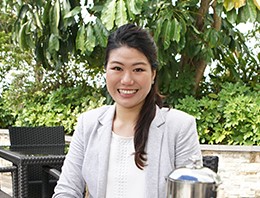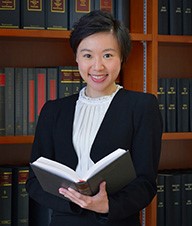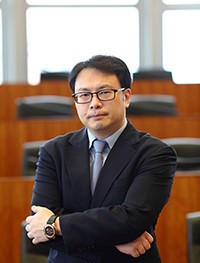In each edition of the Alumni Newsletter we hope to report some news about alumni and to feature alumni who have attained notable achievements, appeared in the law reports or have an interesting story to tell. Although we cannot promise to publish everything we receive, we do welcome any suggestions or contributions that any of you may have.
 Leanne TSE (LLB 2011 & PCLL 2012)
Leanne TSE (LLB 2011 & PCLL 2012)
“Finding your niche – combining passion and legal training”
Leanne grew up loving the arts and graduated from high school having done theatre arts as one of her International Baccalaureate subjects. The advice she got from a CUHK law faculty professor was that she could contribute to the arts field with legal knowledge. Now, she is a qualified lawyer and is working in one of Hong Kong’s art museums.
Leanne graduated from CUHK LLB in 2011 and PCLL in 2012. She won a two-year full scholarship for CUHK final year students to study at the University of Oxford where she did two years of postgraduate studies. After completing the Bachelor of Civil Law in her first year at Oxford, she chose to do a masters in Archaeology specialising in cultural heritage law for her second year. That was the time when world heritage sites were being extensively destroyed in Syria. Leanne had private tutorials with a renowned art historian and archivist from the School of Archaeology and with a cultural property lawyer from the Law Faculty in Oxford. Besides studying international treaties that protect heritage sites and antiquities, she also looked into ongoing issues such as ownership of Nazi-looted art and contemporary topics such as copyright protection of digitised artworks. While in Europe, she attended various international conferences on cultural heritage protection and art crime and met lawyers in London specialising in cultural property law.
After graduating from Oxford, Leanne trained at King & Wood Mallesons in Hong Kong, during which she also did a secondment in the firm’s London office. She qualified into King & Wood Mallesons’ Dispute Resolution Team and took part in notable cases, such as investigations by the Securities & Futures Commission, white collar crimes and high-value civil disputes. During her time back in Hong Kong, Leanne reached out to learn more about the art scene and the potential for art law in Hong Kong. She had the opportunity to meet people from the West Kowloon Cultural District at a talk organised by the Hong Kong Arts Administrators Association. Remembering her background in law and her motivation to pursue art law, the District’s museum for visual culture, M+, approached her to consider a role as Registrar for Acquisitions and Documentation in the Collections Department.
Leanne is all smiles when she talks about her current job. “I feel very valued in the museum. They trusted my legal knowledge and appreciated my passion to pursue this niche area. The vigorous training during law school and at a law firm has moulded me to cope with anything. My experience as a litigator equipped me to manage procedures which are inevitable in transactions of 15 artworks I may be dealing at the same time. Instead of drafting purchase agreements for company shares, I am now drafting acquisition agreements for works of art for the museum’s permanent collection and loan agreements for artworks to be shown in an upcoming exhibition. I also always look forward to my trips to our storage, put on some gloves to check and catalogue artworks.”
 Alice LAU (PCLL 2015)
Alice LAU (PCLL 2015)
“As was expounded by the Greek philosopher Heraclitus, “The only constant in life is change”. The past few years have been an exhilarating journey for me filled with changes, transformations, challenges and opportunities and have witnessed me transition from a Global Business Studies major at CUHK to a wannabe investment banker; then, with a sudden change of heart, from a budding financier to an undergraduate student reading Law at the University of Cambridge, and last but certainly not least, from an aspiring law graduate to finally qualifying and becoming a practising barrister in Hong Kong in 2016.
With my heart set on a career as a barrister early on, I have, throughout my legal studies, actively sought to sharpen my advocacy skills by taking part in various mooting competitions, local and international alike. Having read law abroad before undertaking the PCLL programme at CUHK, I felt that students at CUHK are at a distinct advantage of being provided with a wealth of mooting opportunities, coupled with ample supporting resources, both human and institutional. But the road towards better oral advocacy does not end here. As Helen Keller once said, “There are no shortcuts to any place worth going”. In view of today’s ever more competitive landscape in the legal profession, I have endeavoured to explore further avenues to polish my advocacy skills since I commenced practice. In this regard, I am truly privileged to have been awarded the Charles Ching Memorial Scholarship 2016 by the Hong Kong Bar Association which gave me the opportunity of attending an intensive 2-week advocacy training programme in London offered by the Honourable Society of the Middle Temple.
“Life at the Bar, being a self-employed profession, is inherently very risky”. “Very few makes it through the first 5 years of their practice”. These are notions which have inevitably been instilled in the minds of almost every law student who hints at having the slightest thought of becoming a barrister upon graduation. It is therefore only natural that, like many young barristers in Hong Kong, I have, at the initial stage of my practice, focused on nothing at all save for one: breaking even. This was so until one of my pupil masters struck me with the following wise and enlightening words, “Shrewdness is a gift, kindness is a choice. Gifts are easy – they’re given after all. But choices can be hard.”. As someone who is fortunate enough to have been offered top-notch education which enabled me to pursue a career that I have always longed for, I should really look beyond the financial rewards that this profession brings and lend a helping hand wherever possible to those who may be less privileged. With this in mind, I have since last year signed up for the Duty Lawyer scheme as well as the free legal advice scheme. I have also recently taken up a pro bono case (led by a senior counsel) concerning the intended admission as a barrister in Hong Kong of someone with a previous criminal conviction.
Striking a healthy balance between fostering a financially sustainable practice and shouldering extra duties for a good cause is no easy task, but I am truly grateful that I get to do what I am passionate about day in day out. As the saying goes, “Choose a job you love, and you will never have to work a day in your life”!”
 Ian LEE (JD 2010)
Ian LEE (JD 2010)
“Taking the JD programme at CUHK was one of the best decision I have made, although I did not know the extent of the benefits at that time. I thought it would be useful to have knowledge of the law as it applies to almost everything that we do each day.
I was previously asked to be more specific about the benefits of completing the JD programme, and I replied with the following story which illustrates the importance of legal knowledge even on day-to-day matters:
When I was working in a public organisation, there was a difference of opinion on whether we should make MPF contributions for honorarium paid to volunteers and whether we should file a form for remunerations paid to employees in respect of those volunteers to the Inland Revenue Department (IRD). At that time, I was surprised that the HR and Finance staff were not aware of the legal consequence of making those contributions and filing those forms. From my tax background, I knew that was not the correct approach, as that would instantaneously convert over 300 volunteers to employees of our organisation, which I knew, was not the intention of the organisation nor that of the volunteers, some of whom have contractual restrictions on outside employment from their own employment. The JD programme provided me with the skills to do further legal research on this topic, and more importantly, it gave me the confidence to speak up and advise my organisation against those actions. I explained to them that the court case cited by various parties (including staff from a government department and a top law firm) was taken out of context and would not apply to our situation. I finally convinced them to file a different form for non-employees instead and I drafted a letter on behalf of the organisation to the IRD to clearly state our position.
This case was recently decided by the Court of First Instance and the Judge decided in favour of the taxpayer. It was specifically mentioned in the judgement that the evidence provided (i.e. written replies and forms filed by our organisation) strongly supported the taxpayer’s position. This whole incident illustrated to me the importance of legal knowledge on day-to-day matters, not to take advice on face value, and to be willing to speak up if you know the approach taken is incorrect.
I have recently made a career change to the academic field. I find the experience immensely rewarding, not only because I think I can use my previous experience to help students to better understand the concepts in a practical way, but it also feels like the passing of a baton, that I am now continuing the work of the dedicated and inspiring teachers who taught me when I was studying in the JD programme.”
And to conclude on a very happy note
Alison LI (JD 2017 & PCLL 2018)
“Here is a pre-wedding picture of mine which was taken by my principal Mr. Chak of Chak & Associates. I have attached the photo taken by Mr. Chak for me and my fiancé, Matt Chong, on top of Lion Rock at 6am. Matt and I are getting married on 23 December this year. 🙂”
Congratulations Alison & Matt!
